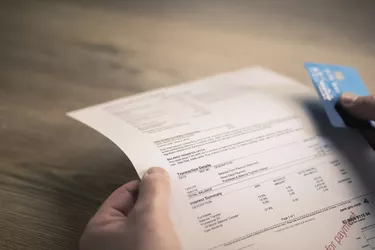
Credit card balances can haunt consumers for years when they make only the minimum payment each month. You can pay the balance in full to avoid unnecessary debt on your credit card account. This does not always work to your advantage if you want to improve your credit score, but it can help you reduce your debt-to-income ratio.
Keeping your credit card balances low is helpful in widening the gap between your income and expenses.
Video of the Day
Video of the Day
Credit Scores
Credit scores are determined by five major factors: payment history, amounts owed, types of accounts you have open, length of credit history, and new credit. Payment history is the leading factor in determining the credit scores of most consumers. You can pay the balance in full, or more than the full amount, but it does not demonstrate that you can make consistent, scheduled payments over time to pay back a debt. If you want to increase your credit score, make payments on your credit card bill each month on time.
Debt-to-Income
Your debt-to-income ratio is important when making major purchases such as a house or car. Keeping your credit card balances low is helpful in widening the gap between your income and expenses. Consider paying off your credit card balances so that you can decrease your liabilities. This will help improve your chances of being approved for new credit or a loan.
Billing Cycles
When you make a payment for more than the balance of your credit card, your account is credited. Your amount owed will appear negative on your credit card statement until a charge is made. If you choose to close the account, the credit card company will return the amount you overpaid on your bill.
In some cases, the creditor may return the money sooner if you go extended periods without using your credit card. Credit card companies make money off interest and finance charges. Paying your bill in full eliminates the opportunity for a creditor to profit off your account. Too many over payments may result in your money being returned so that your balance remains at zero.
Interest Rates
You can avoid excessive fees and finance charges by paying your balance in full. However, paying more than the balance owed does not decrease your interest rate. The impact of the interest charged on purchases is lessened when your account has a credit due to overpayment because you are charging less to your credit card. If you pay your monthly bills in full each month by the due date, you will avoid all interest charges.